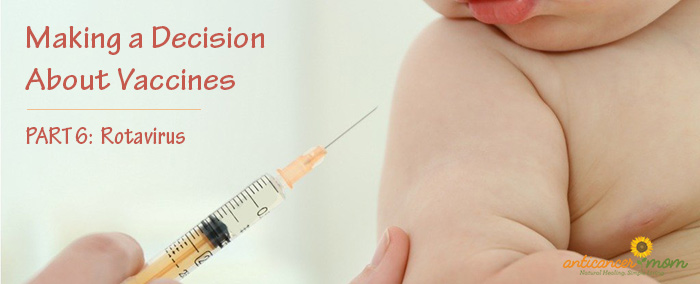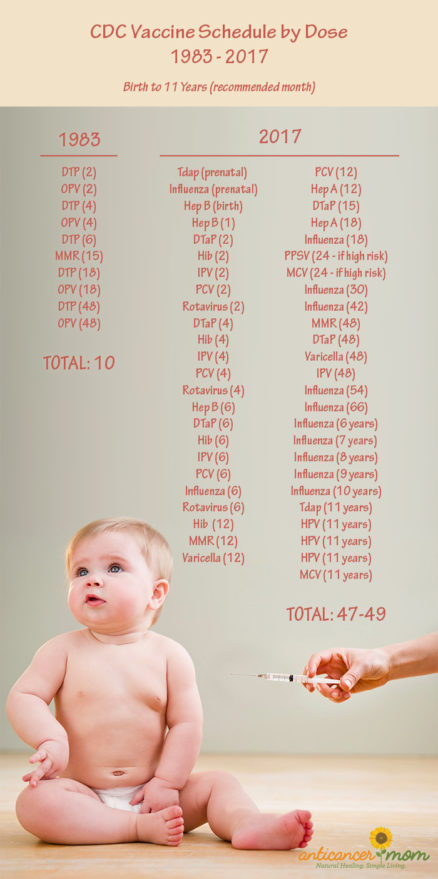
The rotavirus vaccine is a newish vaccine that jumped onto the CDC childhood vaccine schedule in 2006. It has some interesting quirks regarding its development, use, and history. Making a decision about rotavirus vaccine isn’t easy, but I think this post will help you get to a more confident place. Here we go. 🙂

This is Part 6 in my vaccine series discussing which vaccines we decided to give to our children and why. You may also want to check out the other posts in this series:
Part 1: Our Vaccine Choice: Risks, Benefits, Responsibility
Part 2: Hepatitis B and Hib Vaccines
Part 3: Diphtheria, Tetanus and Pertussis Vaccine
Rotavirus
Symptoms:
- frequent, watery diarrhea
- fever
- vomiting
- abdominal cramping
- sometimes respiratory symptoms such as runny nose
Overview: (CDC)
- Rotavirus is passed through fecal matter getting into the mouth by unclean hands. You can get it repeatedly, even with the vaccine, although its severity is seemingly reduced.
- Rotavirus occurs everywhere but it is a serious concern in impoverished populations where basic emergency care and clean water are difficult to come by.
- Diarrhea episodes can be frequent, up to 12 times per day is not unusual.
- Incubation period is short, less than 48 hours.
- Symptoms can last anywhere from 3-9 days.
- Affected person can stay contagious for 2-3 weeks after exposure.
- It has a seasonal preference, popping up in the winter months through May.
- Rotavirus can lead to sever dehydration if not cared for properly (see holistic and emergency care below).
In the U.S. the primary concern of rotavirus is economic. From the CDC website:
“The gastrointestinal symptoms generally resolve in 3 to 7 days…“Annual direct and indirect costs were estimated at approximately $1 billion, primarily due to the cost of time lost from work to care for an ill child.”
From the CDC again: “In the pre-vaccine era… (for this vaccine, pre-2006,)…“rotavirus accounted for 30% to 50% of all hospitalizations for gastroenteritis among U.S. children younger than 5 years of age; the incidence of clinical illness was highest among children 3 to 35 months of age.”
“In the pre-vaccine era an estimated 3 million rotavirus infections occurred every year in the United States and 95% of children experienced at least one rotavirus infection by age 5 years. Rotavirus infection was responsible for more than 400,000 physician visits, more than 200,000 emergency department (ED) visits, 55,000 to 70,000 hospitalizations, and 20 to 60 deaths each year in children younger than 5 years.”
Prevention:
Rotavirus is resistant to anti-bacterial gels and hand sanitizer and even anti-bacterial soap. Washing hands with simple hand soap for at least 20 seconds in warm water is your best bet.
Your child is much more likely to contact rotavirus in a large daycare setting, so choosing a smaller daycare setting or working out home care is best for prevention.
Breastfeeding provides protection against rotavirus.
Holistic and Emergency Care:
Care for rotavirus in children (and adults) should focus on staying hydrated. The main complication from having diarrhea multiple times a day is dehydration and electrolyte imbalance, so a caretaker must be diligent that the child is getting enough fluids. Here are a few tips (from experience.)
- If you breastfeed, keep feedings as normal since breastfeeding is protective.
- Make fruit smoothie popsicles (sweetened with a bit of honey if needed) or frozen bananas for snacks and offer often.
- Mix a probiotic in with applesauce twice daily.
- Encourage small sips of homemade chicken or vegetable broth with a 1/8 tsp of sea or Celtic salt.
- Make electrolyte-rich “lemonade water” for them and add 1/8 tsp Celtic or sea salt.
- Use a Roman Chamomile-Thyme essential oil blend using 1 drop of each added to 1 Tbsp of coconut oil as a carrier. Rub on abdomen 3-4 times daily.
- Among first sign of symptoms, the homeopathic remedy Arsenic Album has shown to be effective in reducing severity and leads to a quicker recovery. Consulting with a certified homeopath can help you with dosing.
If child exhibits extreme fatigue or listlessness, a trip to the emergency room for IV fluids should be considered.
Basic natural home care would also be a great addition to your treatment plan. You can also read more about homeopathic and herbal options in The Unvaccinated Child: A Treatment Guide for Parents and Caregivers.
Rotavirus Vaccine
Ingredients:
RotaTeq (Merck):
- LIVE and WHOLE cross-bred rotavirus strains (G1, G2, G3, G4, and P1) from cows and humans grown in a mix of monkey kidney cells
- sucrose (sugar)
- sodium citrate, phosphate, and hydroxide (for electrolytes)
- polysorbate 80
- cell culture medium (unspecified by manufacturer)
- traces of fetal cow blood
Rotarix (GlaxoSmithKline):
- LIVE and WHOLE most common human virus strain cultured in monkey kidney cells
- sucrose
- dextran (used as a binder or carrier)
- sorbitol (a sugar)
- amino acids
- Dulbecco’s Modified Eagle medium (used to grow and store virus in) —-> made from sodium chloride, potassium chloride, magnesium sulfate, ferric (III) nitrate, sodium phosphate, sodium pyruvate, D-glucose, concentrated vitamin solution, L-cystine, L-tyrosine, amino acids solution, Lglutamine, calcium chloride, sodium hydrogenocarbonate, and phenol red.
- calcium carbonate
- xantham gum
- sterile water
Rotavirus vaccine is given in 2-3 doses depending on which vaccine is used: 2 months, 4 months, (and additionally 6 months for RotaTeq.)
The vaccine is ORAL (given by mouth- not injected) and apparently pleasant tasting (sweet.) It is often a relief to many parents and children that this is not an injectable form vaccine like the rest.
It is important to note that the first dose of Rotavirus vaccine must be given before 15 weeks of age and the last by age 8 months if deviating from the CDC schedule. It cannot be given outside of that time frame.
Another virus, porcine circovirus, a pig and bird virus is found within the Rotavirus vaccine, but the CDC claims it does not affect humans negatively.
Up to 25% of infants given the Rotavirus vaccine will shed viral load in their stools for up to 30 days after vaccination.
It is not unusual for babies to have mild diarrhea or vomiting after a rotavirus vaccine.
In an older version of the RotaTeq vaccine, a noticeable percentage of children developed intussusception- a type of bowel blockage that is treated in a hospital and could require surgery. This complication occurs less with the newer RotaTeq vaccine (the CDC gives a large range: 1 out of 20,000-100,000), but it does still happen.
Vaccine immunity is believed to be at least 3 years but is generally unknown.
VAERS Report:
In 2015, ~2,589 adverse events and 22 deaths were reported to the Vaccine Adverse Event Reporting System (VAERS) after completion of the Rotavirus vaccine. (Remember this reported number is estimated to be 10-100 times less than the actual number and is a volunteer-based reporting system.)
In 2016, these numbers were consistent at ~2,804 adverse events and 20 deaths after vaccination.
Also remember that there are 5-7 other vaccines given at the same time as the rotavirus vaccine, so until there are studies showing INDIVIDUAL vaccine safety studies, we won’t know what truly caused these adverse reactions.

My Thoughts:
It is no joke if you have dealt with diarrhea for any amount of time. It ranges from being mildly no fun to HORRIBLE and persistent.
But very rarely in our first world coziness is rotavirus deadly (this is very different in third world country where dehydration in children is a leading cause of death due to lack of medical care and clean water.)
I read on the CDC website that before the vaccine rotavirus accounted for 30-50% of gastroenteritis cases in children before the first vaccine came out in 2006. This means that there are STILL 50-70% of tummy bug/ diarrhea cases that are going to keep on keepin’ on and we do not (yet) have a vaccine offered to us, such as for norovirus and adenovirus.
If you choose NOT to give this vaccine, your child could possibly be more at risk of getting a longer case of diarrhea, but as you saw above, there are multiple options for prevention and holistic care if you find yourself in this situation.
If you chose to give this vaccine, it is not as controversial as some of the others and does not contain aluminum or mercury, so I feel a little better about it (except for the viral stool shedding- yuck!)
Our Decision:
Our plan of action for possible rotavirus infection was to monitor our child carefully for dehydration. I understood it would not be unusual for her to have diarrhea 10 or so times daily with rotavirus infection. Keeping electrolytes in her through the methods I discussed in the treatment section above would be helpful to rehydrate.
We would also give a higher than usual doses of probiotics to restore her healthy gut flora.
With our first world living conditions and emergency care, even severe diarrhea is treatable and non-life threatening.
Infants in daycare and formula-fed babies are at a much higher risk for rotavirus infection and complications. Since my daughter didn’t have these risk-factors in her first year of life (when rotavirus is most severe,) I was not overly concerned.
As of this writing my daughter is 8 years old and we have two younger daughters who all have never had a severe cases of rotavirus (to our knowledge- doctors do not typically screen for rotavirus anyways.)
None of them are vaccinated with the rotavirus vaccine. We have had a few cases of diarrhea and tummy bugs to contend with over the years, but I knew how to care for them and all three have recovered in a few days or less.
Sources Cited:
- https://www.cdc.gov/vaccines/pubs/pinkbook/rota.html
- (Breastfeeding + rotavirus study) https://www.sciencedirect.com/science/article/pii/S1045187004000512
- The Unvaccinated Child: A Treatment Guide for Parents and Caregivers
- https://www.cdc.gov/vaccines/hcp/vis/vis-statements/rotavirus.html
- VAERS: Vaccine Adverse Reaction System: https://vaers.hhs.gov/
- Underreporting of VAERS statistics: https://www.fda.gov/downloads/Safety/MedWatch/UCM201419.pdf
- RotaTeq vaccine information: https://www.fda.gov/downloads/BiologicsBloodVaccines/Vaccines/ApprovedProducts/UCM142288
- Rotarix vaccine information: https://www.gsksource.com/pharma/content/dam/GlaxoSmithKline/US/en/Prescribing_Information/Rotarix/pdf/ROTARIX-PI-PIL.PDF



Hi Courtney,
Have only spent ten minutes on your site and my comment will be off topic but I thought you might be interested. First off I got here from a search that led to your facing the critics post, sorry you had to put up with all that, as you were apparently not the correct sort of cancer survivor, jeez. I am a physician, spent ten years at FDA in a relatively obscure office dedicated to getting drugs for rare diseases to market. During my time at FDA I gradually came to realize that treatments were not always science driven, but rather financially driven. This judgment was bolstered after leaving FDA and doing independent research. Haven’t spent a great deal of time on your site, but if you want a real eye opener look at what Dr F. R. Klenner published in the 1950s on vitamin C and polio.
Last week I decided to just record videos of going through the medical literature on a variety of topics. As I mentioned this is a bit off topic and the first videos are concerned with zinc as a treatment for depression. Zinc is actually a great anti-depressant per the clinical trials and does not have the “side effect” often seen in SSRIs of clinically worsening depression and increased suicidal ideation. By going through the medical literature it makes it much more difficult for the scoffers to say, “that’s bunk, you are full of it” (to put it politely) when the studies are right in front of their nose. While the first videos deal with alternatives to pharmaceutical anti-dpressants over time I suspect I will be looking at various studies relating to cancer and vaccines. Just thought it might be something you would want to keep an eye on. The first video may be found here: https://www.youtube.com/watch?v=Suwc5-obeBU&t=399s
To say something at least a little apropos to your topic, leaving aside the potential for toxicity of vaccines, leaving aside the lack of dosage adjustment between pediatric and adult patients, leaving aside the lack of a humoral immune system in newborns, leaving aside questions of risk/benefit for rare or non-fatal diseases, the FDA does not approve vaccines based off efficacy studies, (showing the vaccine actually works) they approve them based from the surrogate marker of demonstration of an antibody response to the vaccine. While it is nice the vaccines generates an immune response, that in and of itself is not evidence the vaccine actually works.
In any event, congratulations on your recovery from cancer and here’s
To Your Health,
Paul
I am just now seeing and reading all of your vaccine posts. The information, the background history and your personal experiences/opinions that you share in these posts are SO wonderful and I TRULY appreciate the work that you put into accurately covering these vaccines; keeping the information “raw” and real. Thank you so much for sharing all of this!!!
You’re welcome, Tanya! Means so much to hear that. 🙂
I believe vaccine therapy is un-natural. You are inducing a disease in a healthy organism. There is no scientific evidence that a vaccine will protect from a given disease. Even if it may protect there are many other diseases which can surface more easily in a vaccine injected organism because the immune system may have been weakened by the vaccines.
In my opinion, a healthy diet, exercise and fresh air and sunlight can be more effective. The antibiotic have made the bugs resistant and so on.
The best way is good nutrition, stress management and natural life style.